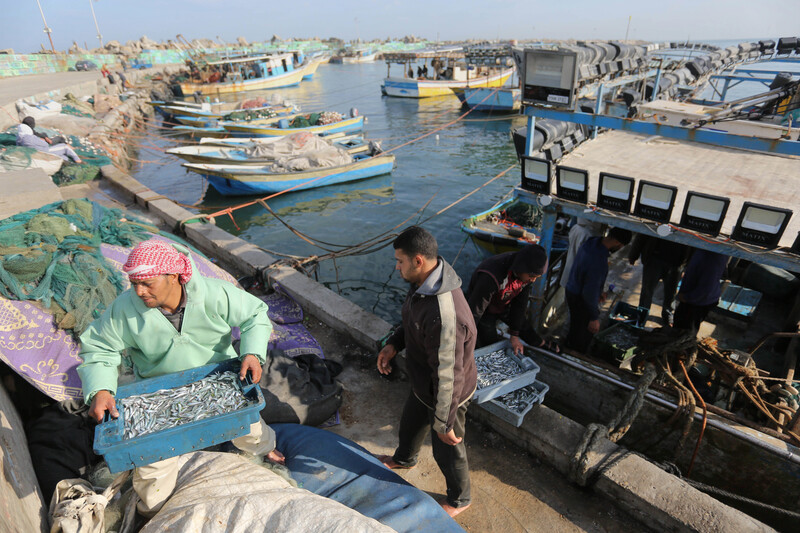Rights and Accountability 24 May 2019

Palestinian fishers unload their catch at Gaza’s seaport on 2 April.
APA imagesIsraeli avocado growers have been banned from accessing their greenhouses in Jordan Valley settlements, the Israeli government announced this week. The decision was made after settlers set fire to fields belonging to Palestinian farmers in Asira al-Qibliya village last Friday, causing damage but no injuries.
Of course nothing in the above paragraph is true – except that Israelis from the notorious Yitzhar settlement did in fact set fire to fields in Burin and Asira al-Qibliya, villages near Nablus in the north of the occupied West Bank on Friday.
Settlers also threw stones at Palestinian homes and fired guns into the air while soldiers looked on and did nothing.
At first Israel blamed the fires exclusively on Palestinians, until the human rights group B’Tselem published video showing gun-toting settlers setting fields on fire:
“Predictably, none of the settlers who torched the area were arrested or investigated, and as always they enjoy almost full immunity,” B’Tselem states.Punitive measure
Contrast that with the punitive measure imposed on an entire industry in Gaza after incendiary balloons launched from the territory caused brush fires in southern Israel earlier this week.
On Wednesday, Israel limited the fishing zone in which it lets Palestinians ply their trade from 15 to 10 nautical miles off of Gaza’s coast.
One day earlier, Israel had said that Palestinians would be allowed to sail up to 15 nautical miles out in some sections of Gaza’s waters:
COGAT, the bureaucratic arm of Israel’s military occupation, tacitly acknowledged that its restrictions were a form of collective punishment. It said on Tuesday that the expansion of the permitted fishing zone was “a civilian policy to avoid a humanitarian deterioration in the Gaza Strip and part of a policy that differentiates between terrorist activities and an uninvolved civilian population.”In other words, COGAT prided itself on a policy that distinguished between combatants and civilians, and then immediately did the opposite.
Fishers told the human rights group Gisha that before Wednesday’s announcement Israel was in practice enforcing a maximal distance of only 12 nautical miles.Under the Oslo accords signed by Israel and the Palestine Liberation Organization more than 25 years ago, Palestinian fishers are permitted access up to 20 nautical miles out from Gaza’s coast.
Israel has never allowed Palestinians access beyond 15 nautical miles, however, and that limit was only introduced for part of Gaza’s coast on 1 April this year. On 30 April, the zone was reduced to 6 nautical miles.
Between 5 and 12 May, “access to the sea was banned altogether,” according to Gisha.
The impunity enjoyed by Israeli settlers who attack Palestinians and their property stands in stark contrast to the collective punishment imposed on Gaza fishers for events completely beyond their control.
Double standard
It is but one example of a double standard in an inherently unequal system in which the law enshrines one group of people with superior rights and privileges over everyone else.
(There’s a word for a system like that.)
The “everyone else” in this case being the Palestinians, indigenous to the land, but in the way of the settler-colonial ambitions of the Israeli state.
The situation of a Palestinian fisher in Gaza is not analogous with an avocado grower in a West Bank settlement, so the role reversal at the top of this article illustrating Israel’s double standards is flawed.
The avocado grower, along with the arsonist and armed settlers from Yitzhar, is an actor implementing the system of occupation in tandem with the state, which aims to grab and annex Palestinian land, but without the people.
The system was not designed to treat the Gaza fisher struggling to put food on his family’s table equally to the avocado grower. It was designed to pressure him and his family to leave. Or at least cause Palestinians to collectively relinquish their desire to exercise their right to self-determination.
Ripple effect
Israel’s restrictions on Palestinians’ ability to fish ripples far beyond those working in the industry.
Fish caught off of Gaza’s coastal waters are a major source of nutrition for Palestinians in the territory, though one that fewer and fewer can afford.
After 12 years of Israeli air, land and sea blockade, unemployment and poverty have skyrocketed in the territory.
Half of Gaza’s population depends on emergency food assistance. UNRWA, the UN agency for Palestine refugees, warned last week that it may not be able to provide that aid as it made yet another emergency appeal for funds.





